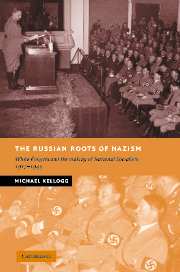Book contents
- Frontmatter
- Contents
- Acknowledgments
- List of abbreviations
- Introduction
- 1 The far right in the German and Russian Empires
- 2 At the extreme in the Ukraine and in Germany
- 3 “Hand in hand with Germany”
- 4 The international radical right's Aufbau (reconstruction)
- 5 “Germany–Russia above everything”
- 6 Conspiracies of fire and the sword
- 7 “In Quick March to the Abyss!”
- 8 The four writers of the apocalypse
- 9 Aufbau's legacy to National Socialism
- Conclusion
- Bibliography
- Index
- NEW STUDIES IN EUROPEAN HISTORY
1 - The far right in the German and Russian Empires
Published online by Cambridge University Press: 23 July 2009
- Frontmatter
- Contents
- Acknowledgments
- List of abbreviations
- Introduction
- 1 The far right in the German and Russian Empires
- 2 At the extreme in the Ukraine and in Germany
- 3 “Hand in hand with Germany”
- 4 The international radical right's Aufbau (reconstruction)
- 5 “Germany–Russia above everything”
- 6 Conspiracies of fire and the sword
- 7 “In Quick March to the Abyss!”
- 8 The four writers of the apocalypse
- 9 Aufbau's legacy to National Socialism
- Conclusion
- Bibliography
- Index
- NEW STUDIES IN EUROPEAN HISTORY
Summary
National Socialism with its intensely anti-Bolshevik and anti-Semitic ideology arose primarily as a synthesis of radical right German and Russian movements and ideas. This chapter illuminates the background of National Socialism's genesis by examining the development of the far right in Imperial Germany and the Russian Empire up to the Bolshevik Revolution of 1917. During a dynamic period of increasing industrialization and democratization in the late nineteenth and early twentieth centuries, Imperial German and Russian radical rightists feared for their elevated societal positions, and they developed intensely anti-Western, anti-socialist, and anti-Semitic views. These beliefs later found prominent expression in Hitler's National Socialist movement, which fought against what it perceived to be an insidious international Jewish alliance between ravenous finance capitalism and murderous Bolshevism.
Völkisch German ideology increasingly represented Jews as racial parasites, but it also regarded the Jewish essence metaphysically as the manifestation of shallow materialism. In the spirit of the “denial of the will to live,” a concept that the German philosopher Arthur Schopenhauer championed, völkisch theorists such as the composer Richard Wagner and the author Houston Stewart Chamberlain sought German religious redemption. This German struggle against the perceived worldly Jewish nature primarily took place on the spiritual plane and not on the political stage. While völkisch ideologues in Imperial Germany developed a substantial ideology based on hopes for German inner redemption as racially and spiritually superior beings, they could not achieve anything approaching the modest political success of Imperial Russian far rightists in the years leading up to the Russian Revolution of 1917.
- Type
- Chapter
- Information
- The Russian Roots of NazismWhite Émigrés and the Making of National Socialism, 1917–1945, pp. 18 - 47Publisher: Cambridge University PressPrint publication year: 2005



